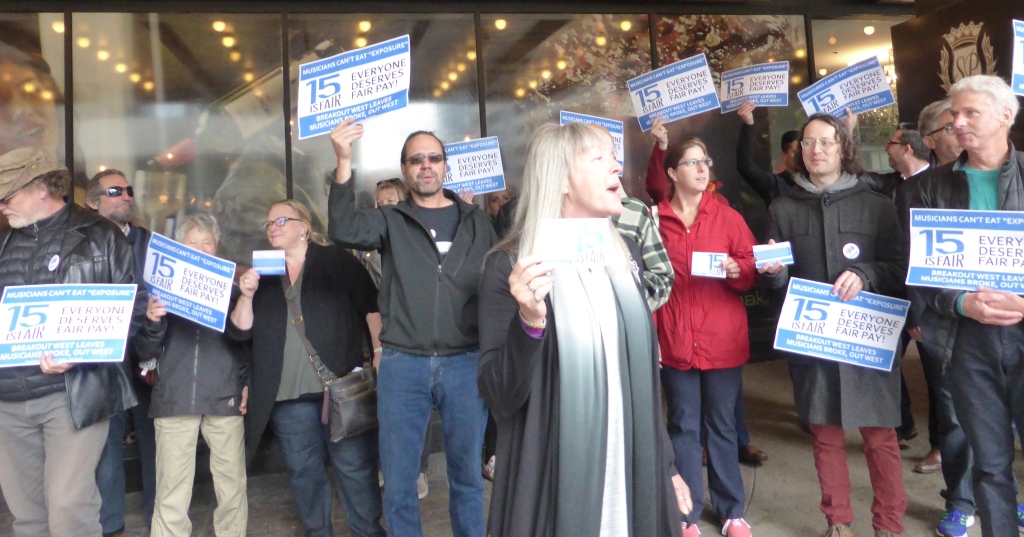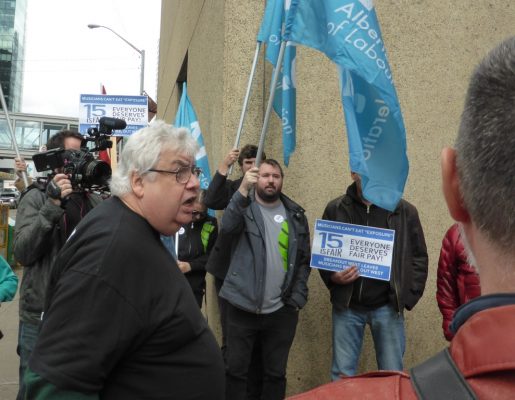Protest erupts at BreakOut West
Posted on September 15, 2017 By Mike Ross Entertainment, Front Slider, life, Music, news
 It’s interesting to reflect on the slow and steady increase of how often and in how many ways musicians have been convinced to perform for free – for “exposure.”
It’s interesting to reflect on the slow and steady increase of how often and in how many ways musicians have been convinced to perform for free – for “exposure.”
On the flip side, shouldn’t they be free to do so? The music business is a different beast than it used to be.
So here we have the horns of a dilemma that led to a protest march outside the Sutton Place Hotel in Edmonton on Thursday afternoon.
It was a peaceful labour action. It included several dozen members of the local American Federation of Musicians union (AFM): some players from the Edmonton Symphony Orchestra, local jazz legend P.J. Perry, and others. They waved signs and flags to protest the fact that musicians are not being paid to perform at the BreakOut West music industry conference (BOW) taking place at venues around town this weekend.
 AFM’s Canadian vice president Alan Willaert (right) came in from Toronto to rally the troops on the sidewalk: “This is going to send a message to all the other festivals around this country that if you screw around with musicians, you’re going to pay the price!”
AFM’s Canadian vice president Alan Willaert (right) came in from Toronto to rally the troops on the sidewalk: “This is going to send a message to all the other festivals around this country that if you screw around with musicians, you’re going to pay the price!”
The protesters marched to the front of the host hotel and chanted, “Pay the bands, not the man! PAY THE BANDS, NOT THE MAN!”
I asked someone: Is that “The Man,” as in the establishment? No, a woman said, it’s short for “manager.”
If anyone from BOW noticed, there was no indication. The lobby was dead. Outside, the protesters actually seemed to be having fun as they called for fair pay for all the mainly-if-not-entirely non-union musicians playing this conference. The union demands that all performing musicians be paid at least $15 per hour according to union scale.
The brouhaha on 101st Street drew a small crowd. A passer-by asked, “What’s this all about?”
Oh, man, you had to ask, didn’t you?
It’s complicated.
This is one of those arguments were each side appears to be represented by dedicated, intelligent, articulate and selfless professionals who believe they’re in the right – and there may be more than one side.
Reached after the demonstration on Thursday, BOW board president Christine Rogerson says the bands are actually getting paid in kind, with every musician given a free pass to all conference events.
“It’s not just one per band, it’s one for every musician, even if you’re a 10-piece band,” she says.
A huge number of industry professionals have been brought in to check out as many acts as they can; the bigwigs include Allan Reid, head of the Canadian Academy of Recording Arts and Sciences and the Juno Awards, along with reps from record labels, booking agents, festival producers, club owners, publicists, talent buyers and the whole myriad of people who aren’t musicians yet essential to the business of music. There’s lots to learn if you’re a young musician.

Juno-winning Edmonton saxophonist P.J. Perry
The AFM isn’t having any of it.
Asked what he felt they accomplished, Willaert replies, “The protest drew significant attention to our issue with BOW, and further informed and united musicians against this inappropriate and unconscionable exploitation of musicians.”
Rogerson’s side: “I appreciate the union is representing artists, and the industry. They don’t feel we are compensating artists appropriately, but I don’t think they’re seeing the value of what we do.”
It was prominent Edmonton musician Ben Sures who stirred the pot: He asks why is the union going after BOW “and not all the other ones.” The other ones include Canadian Music Week, the Folk Alliance, and NXNE, even those Landmark Events showcases, there’s tons of them all over the world, some delivering more industry clout than others, from good to none at all – and Willaert declares, “We will be going after all festivals who do not pay.”
Willaert says that the Canadian AFM also lobbies the government: as the driving forces behind the amended Copyright Act in 1997, Neighbouring Rights, federal Status of the Artist legislation, NAFTA negotiations, temporary entry into the US and many other actions. They recently sent a notice to Canadian Music Week, the biggest showcase festival in Canada.
There are allegations the union goes too far. According to a reliable source, at least one band that wanted to play BOW pulled out after they were threatened with having their travel visas disapproved. You apparently still need the union if you want to perform outside of Canada.
Several Edmonton musicians and various industry people have literally called “bullshit” on the tactics in this particular case. They accuse the union of being woefully out of touch with the modern realities of the music business. Sure, it’s great if you’re in the symphony or a professional jazz musician, but a lot of musicians at the indie level are barely aware there’s a musician’s union at all, and don’t seem to think they need it.
 Sures (right), a lifelong union supporter, likens the protests to the early attempts by record labels to prevent file-sharing. Yes, it just about destroyed the record business, but it’s common practice now. As for this labour action, Sures makes his stand clear, “I am all for unions. I wish my union worked for the context of my career but it just doesn’t, it’s not designed for the work options available to me. I don’t think protesting one of the smaller showcase festivals or bullying the few members attending is going to do anything to help the big picture. Organizations need to make hard choices and adapt in order to remain relevant and useful.”
Sures (right), a lifelong union supporter, likens the protests to the early attempts by record labels to prevent file-sharing. Yes, it just about destroyed the record business, but it’s common practice now. As for this labour action, Sures makes his stand clear, “I am all for unions. I wish my union worked for the context of my career but it just doesn’t, it’s not designed for the work options available to me. I don’t think protesting one of the smaller showcase festivals or bullying the few members attending is going to do anything to help the big picture. Organizations need to make hard choices and adapt in order to remain relevant and useful.”
Sures goes on to suggest that a young rock band performing at a showcase festival may be no different than a young violinist auditioning for the symphony orchestra (which is well served by the musicians union). Neither of them are being paid for the auditions. Maybe events like BOW amount to “one big audition,” Sures says.
Willaert is asked if he thinks the musicians union is in touch with the realities of the modern music business. He replies, at length, “The internet has been an employers’ dream come true. They can disseminate information to musicians en masse, with information like ‘playing for free will get you exposure’; ‘buyers from other festivals will see you’; ‘record companies will see you and sign you to their label.’ And like all things on the internet, if it’s said often enough, people believe it. Meanwhile, nothing can be farther from the truth.
“Playing for free sends the message that your music has no value. Your minimum price becomes your maximum. If you agree to perform for less than you’re worth, that’s all you will be offered. These are employers, and they look at their bottom line, not yours.
“Yes, you may be invited to play other festivals, perhaps in exotic countries and locations. For free. Be prepared to spend a whole lot on travel, accommodations and per diem. Such a deal.
“Major label executives don’t hang out in an Edmonton bar at 2:00 am. No, you will not be seen and no, you will not be signed.
“BOW claims to assist the musicians in finding more festivals (more non-paying jobs), and recommends they seek government funding to further their career. This is absolutely nuts. What other job in Canada is fully subsidized by government funding in perpetuity? And should they be?
“While they profess to help musicians, they are actually destroying the music industry as a viable career in this country. If there is no money to be made as an artist, those future generations will choose a different career. That means the death of music, and Canadian content, in this country – all thanks to greedy festivals who think that everyone who organizes or attends a music festival should be paid, except for the people the whole thing is about – the musicians.”
There may be some bipartisan middle ground here: Maybe the AFM could knock it off with the alleged bullying tactics and the anti-manager chants – and BOW could invite them inside to host a panel. They have a lot to talk over.












0 Responses to Protest erupts at BreakOut West